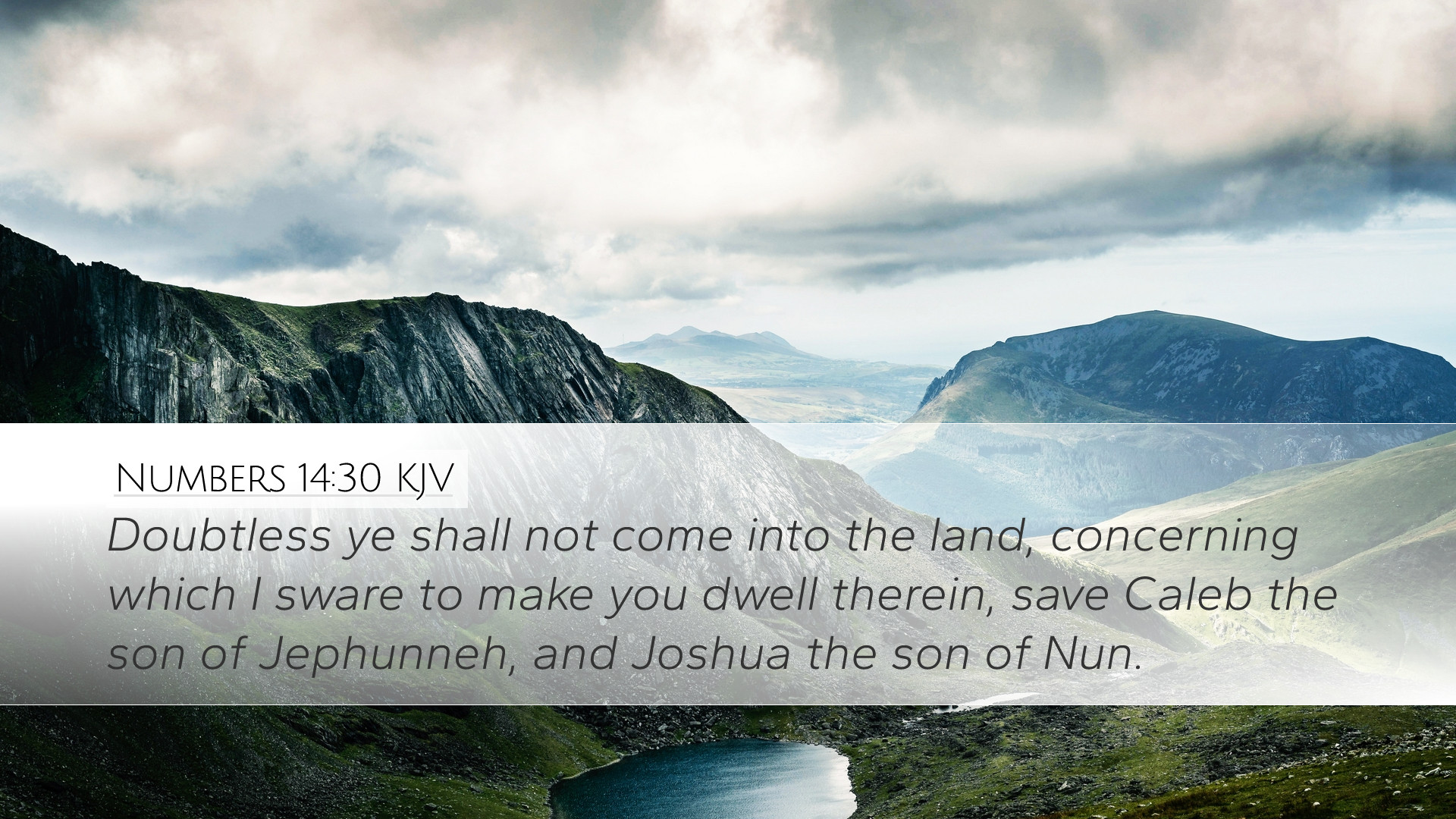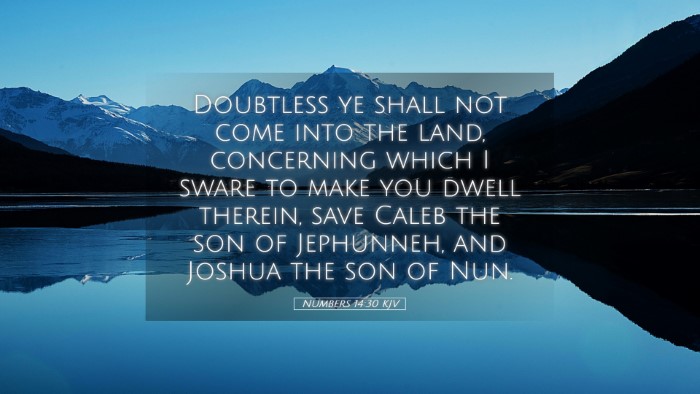Commentary on Numbers 14:30
Bible Verse: "Doubtless ye shall not come into the land, concerning which I sware to make you dwell therein, save Caleb the son of Jephunneh, and Joshua the son of Nun."
Introduction
The narrative surrounding Numbers 14:30 encapsulates a pivotal moment in Israel's journey to the Promised Land. The rejection of the report from the twelve spies resulted not only in national despair but in a divine judgment that altered the fate of an entire generation.
Contextual Background
This passage occurs in the broader context of Israel's wilderness wanderings. After witnessing numerous miracles, the Israelites' lack of faith culminated in their refusal to enter the Land God promised to their ancestors. This resulted in severe repercussions outlined in God's judgment as expressed in this verse.
Insights from Commentaries
Matthew Henry's Commentary
Matthew Henry emphasizes the gravity of Israel's unbelief. He notes that God's promise was contingent upon faith and obedience. The phrase "Doubtless ye shall not come into the land" serves as a sober reminder of the consequences that accompany a lack of trust in God's word. Henry also highlights Caleb and Joshua's faithfulness, noting how their trust in God distinguishes them from their peers.
Albert Barnes' Notes on the Bible
Albert Barnes provides an analysis of the judgment pronounced in this verse. He interprets "save Caleb and Joshua" as a divine exception, illustrating God's mercy amid judgment. Barnes elaborates on the notion that Caleb and Joshua represent a remnant of faithful believers who remain steadfast in their commitment to God's promises. Their unwavering faith serves as a model for present-day believers, as they faced overwhelming obstacles yet trusted in the Lord's ability to fulfill His promises.
Adam Clarke's Commentary
Adam Clarke delves into the implications of Israel’s collective failure, emphasizing that the fate of an entire generation was sealed due to the failures of their leadership and the people's fear. Clarke remarks on the nature of divine selection, showcasing Caleb and Joshua as exemplars of faith amidst a faithless group. He asserts that God's choice of these men reflects His sovereign grace and the importance of personal faith in the face of communal doubt.
Theological Implications
This verse highlights several critical theological concepts influential for pastors and scholars alike:
- Faith and Obedience: The necessity of faith in God’s promises remains paramount. Unbelief can lead to severe consequences, as evidenced by the Israelites' fate.
- Divine Sovereignty: God's ability to choose individuals according to His purpose emphasizes His sovereignty. Caleb and Joshua were chosen not based on majority opinion but divine will.
- The Remnant Concept: The idea that a faithful remnant survives amid widespread disbelief is a recurring theme in Scripture. This serves as a source of hope for contemporary believers.
Lessons for Today’s Believers
The lessons extracted from Numbers 14:30 transcend the historical narrative, offering practical applications for modern-day faith.
- Trust in God: Believers are reminded to trust in God’s promises, even when circumstances seem daunting. Caleb and Joshua's confidence in God's ability challenges followers of Christ to model similar faith.
- Importance of Leadership: The failure of the Israelite leaders influenced the community's faith. Today, spiritual leaders are tasked with guiding and encouraging their congregations toward faith in God.
- Consequences of Unbelief: Just as the Israelites faced divine judgment for their unbelief, modern believers must consider the seriousness of doubt and its impact on both personal and communal faith.
Conclusion
Numbers 14:30 serves as a profound reminder of the weight of collective faith and the consequences of doubt. By reflecting on the insights shared by Matthew Henry, Albert Barnes, and Adam Clarke, pastors, students, theologians, and Bible scholars can draw rich theological understanding pertinent to faithfulness, leadership, and divine judgment. Just as Caleb and Joshua stood firm in their trust in the Lord, so too are the faithful called to remain steadfast, irrespective of the prevailing unbelief around them.


